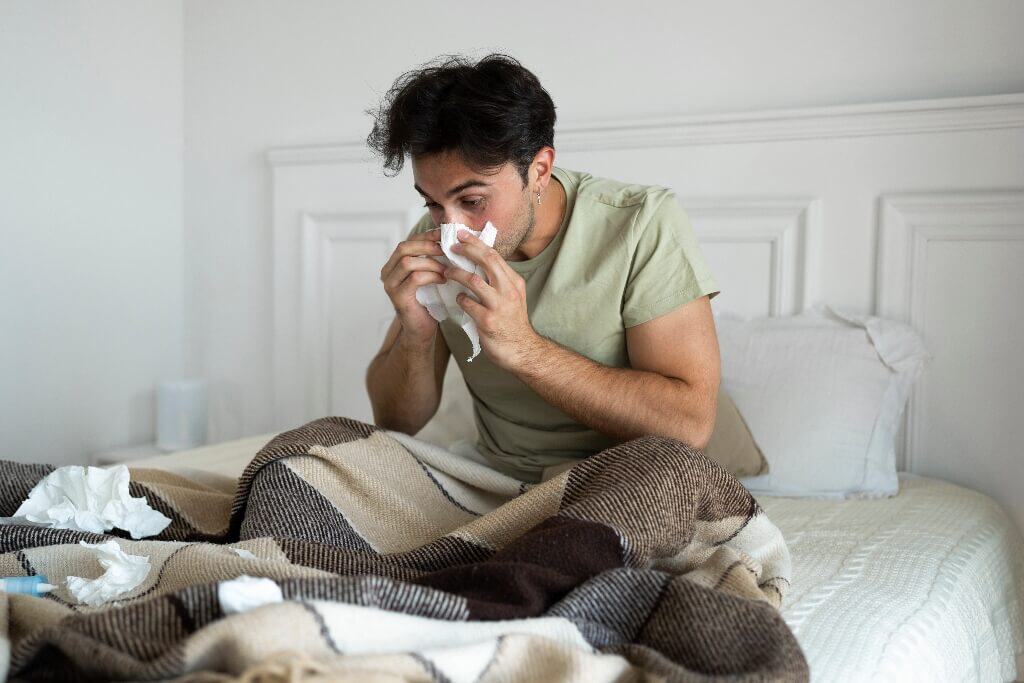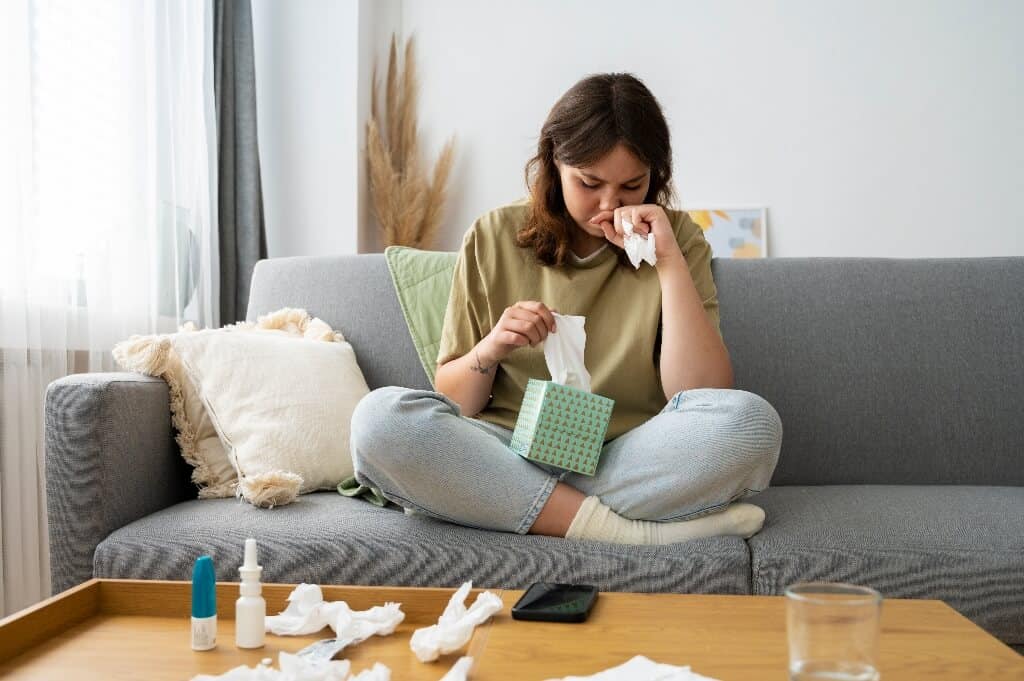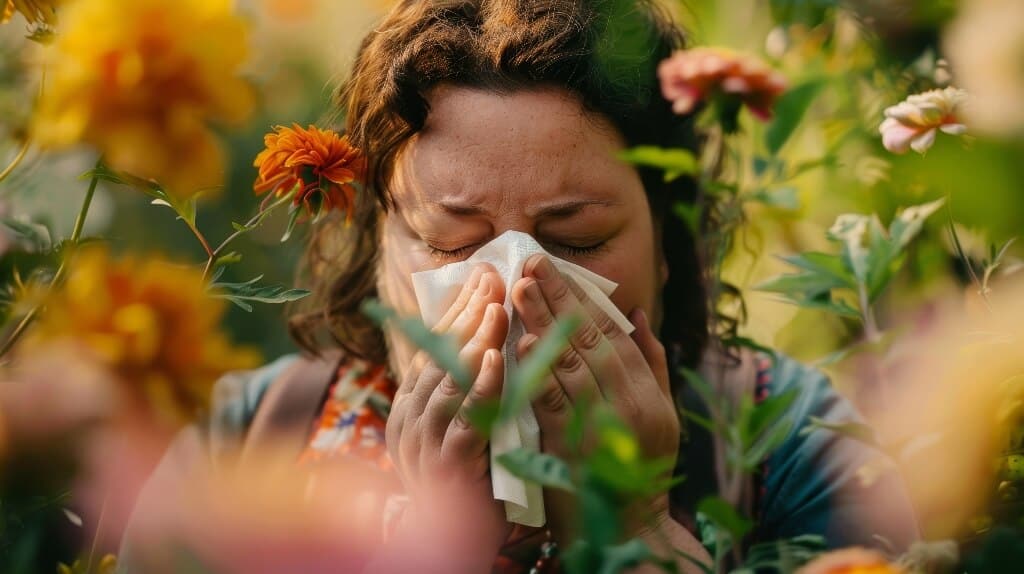Allergies affect 1 in 5 people in the UK. While some people can nip them in the bud by reducing their exposure to allergens or easing their symptoms with medications, home remedies and lifestyle changes may not be enough to keep severe allergies under control. In such cases, healthcare professionals may recommend immunotherapy. In this article, we will break down what immunotherapy for allergies is, how it works and the different types of allergies it is helpful for.
So, What is Immunotherapy?
Commonly referred to as desensitisation, immunotherapy aims to make the immune system less sensitive to the allergen by building up tolerance. Generally, it is used for severe allergies, such as in cases where allergic rhinitis cannot be controlled by anti-allergy medications or if someone has had a serious allergic reaction to bee or wasp venom.
How Does Allergen Immunotherapy Work?
Allergen immunotherapy involves administering increasing doses of allergen extracts on a regular schedule that lasts between 3 to 5 years. The doses are administered by injection or tablets under the tongue until a maintenance level is reached. It is worth noting that long-term tolerance for the allergen can vary from person to person.
Which Allergies Can Be Treated With Immunotherapy?
Immunotherapy is used to treat a number of allergies, including:
Environmental Allergies
Immunotherapy is an effective treatment for:
- Pollen allergies
- Mould allergy
- Pet allergies
- Dust allergy
- Insect venom hypersensitivity
Not only can immunotherapy reduce environmental allergy symptoms but it can also help prevent new allergies, such as allergic rhinitis and eczema. It can even help to control asthma by preventing the allergic response that triggers symptoms.
Food Allergies
Although immunotherapy cannot cure food allergies, it can be used to build up a tolerance for small quantities of a specific food allergen such as peanuts. The aim is to reduce reactivity to the allergen. This treatment is currently only available privately and is done under very controlled conditions.
When is Immunotherapy Helpful?
If you have one of the following allergies, you may be a good candidate for immunotherapy:
Severe Reactions to Bee or Wasp Stings
Immunotherapy is not necessary if you experience minor reactions to bee or wasp stings, such as a nettle rash or swelling. However, patients with severe allergic reactions such as swelling of the airways or sudden collapse (anaphylaxis) should always carry injectable adrenaline (epinephrine). In some cases, they may require further medical aid after a sting. Venom immunotherapy may be offered over 3 to 5 years as it has been proven to be highly effective, providing 98% protection against wasp stings and 90% protection against bee stings.
It is worth noting that some patients experience reactions to the immunotherapy injections. That is why immunotherapy must be administered by a trained allergist or immunologist.
Severe Hay Fever
In most cases, clinics will not offer patients immunotherapy for severe hay fever unless they have taken the usual treatments in the right combination first, including:
- Daily use of antihistamine tablets
- Consistent use of sodium cromoglycate eye drops
- A regular steroid inhaler for those with asthma
- A regular steroid nasal spray, which should be started at least 3 weeks before the hay fever season begins
In cases where these medicines are used properly but fail to control symptoms, other treatments may be recommended, such as intranasal antihistamine sprays or oral steroids. If patients still have very severe symptoms, they may be accepted for pollen immunotherapy.
Animal Allergies
Immunotherapy is not recommended for patients who keep pets they are allergic to. This is because the treatment is unlikely to succeed if there is a history of continuous exposure to the allergen-causing symptoms.
For patients who occasionally encounter pet allergens, symptoms can be managed by taking antihistamines and using inhalers at least 30 minutes before exposure. For patients who have severe reactions to even minimal exposure, immunotherapy may be required. An allergy specialist can assess the impact of exposure.

When is Immunotherapy Unhelpful?
Immunotherapy is not helpful for the following conditions:
Multiple Allergies
It is uncommon for patients to receive immunotherapy for three or more allergies. In cases where a patient has severe symptoms caused by multiple allergens, immunotherapy may be given to reduce one or two of these symptoms, allowing the patient to manage their allergies with usual drug treatments.
Allergic Rashes
Immunotherapy cannot be used to treat rashes like eczema or nettle rash.
What Does Immunotherapy Treatment Involve?
If you think immunotherapy may be the best path to help you manage your allergy symptoms, here is what to expect.
Screening
An allergy specialist will carry out some allergy tests, such as a skin prick or blood test for allergic antibodies. A physical examination will also be carried out to assess your general health.
It is crucial to stabilise conditions like high blood pressure and asthma before starting treatment. If you are taking a beta blocker to control your blood pressure, you and your GP will need to find an alternative treatment.
What If I’m Asthmatic?
If you are asthmatic, you are less likely to be considered for immunotherapy, especially if it is severe. This is because people with asthma are most at risk if a severe allergic reaction occurs. But that does not mean asthmatics cannot get immunotherapy for their allergies.
For example, if you have asthma that only occurs during pollen season, you may be able to undergo immunotherapy as long as it is started well before the season. Similarly, an asthmatic patient with a severe allergy to bee or wasp venom may also undergo immunotherapy. In such cases, the risk of a life-threatening reaction to the venom outweighs the risk of any reactions during immunotherapy. To reduce risks, maintaining careful asthma control is crucial.
Referral
If the specialist thinks you need treatment, you may have to join a waiting list. If you have severe hay fever, it is a good idea to ask for a referral as soon as possible as pollen immunotherapy must be started well before the next season.
It is worth noting that you will not see results immediately. Usually, it takes at least 6 months for symptoms to improve. Until the effects are well-established, you should continue using your usual medications. To decrease the risk of allergies returning, it is advisable to continue immunotherapy for 3 to 5 years.
If the specialist thinks you need treatment, you may have to join a waiting list. If you have severe hay fever, it is a good idea to ask for a referral as soon as possible as pollen immunotherapy must be started
Immunotherapy Injections
Allergy shots are the most common type of immunotherapy treatment.
What are Allergy Shots?
Subcutaneous immunotherapy or SCIT involves administering a course of injections that contain purified allergen extracts over a period of time.
At the start of the treatment, injections will be given once or twice a week for 6 to 12 months. During this induction phase, the allergen doses gradually increase.
How Long Do I Have to Take Allergy Shots?
Once the maintenance dose is reached, injections will be administered every few weeks for at least 2 years.
If you no longer need most or any of your allergy medication after 3 to 5 years, your allergist may stop immunotherapy.
Is Anaphylaxis Common?
Although serious allergic reactions to immunotherapy injections are rare, treatments should be conducted in a clinic equipped with epinephrine auto-injectors just in case of a serious reaction or anaphylaxis. After each injection, you will be asked to wait at least 30 minutes to ensure that any serious side effects can be treated quickly. However, a reaction can occur hours later.
Symptoms of anaphylaxis include:
- Trouble breathing
- Tightness in the throat
- Swelling
- Hives
- Nausea
- Vomiting
- Fainting
- Abdominal pain
- Diarrhoea
If you experience these symptoms, the epinephrine auto-injection should be administered immediately.
How Long Do Allergy Shots Last?
For many people, immunotherapy shots result in a long-lasting reduction of symptoms; for others; immunity is lost after a while and they may have to resume allergy shots.
If you are struggling to control your allergy symptoms following treatment, it is wise to consult your allergist for testing and treatment options. You may have developed a new allergy, which is common after moving or starting a job in a new environment. No matter what the case is, it is important to not let your age be a barrier to starting or restarting treatment.

Sublingual Immunotherapy
Specialist centres may use sublingual immunotherapy (SLIT) for children and adults with airborne allergies. This is an alternative to injections that involve a dose of the allergen given as a spray under the tongue or daily tablet, with the dose gradually increasing.
While there is a risk of a mild allergic reaction, this usually disappears over time. Not to mention, this treatment has been proven to be effective in reducing the severity of symptoms, with patients taking less medication to control their allergy.
How is SLIT Administered?
After the first dose is administered in a clinic, you can take the tablets at home by yourself. However, epinephrine auto-injects need to be available if a severe allergic reaction or anaphylaxis occurs.
It is advisable for patients using tablets for grass or ragweed pollen to take them at least 4 months before the start of their pollen season. To maximise the effectiveness of the SLIT tablets, you should take them throughout the entire pollen season.
Some grass pollen tablets can be taken by children as young as 5 years old. Ragweed and dust mite tablets, on the other hand, are only available for patients between 18 and 65 years old. Dust mite tablets should be taken year-round, with noticeable benefits being experienced after 8 to 14 weeks of daily dosing.
How Do I Take SLIT Tablets at Home?
Simply place the tablet under your tongue and hold it without swallowing for at least 1 minute. After taking the tablet, do not eat or drink for 5 minutes. It is crucial to immediately wash your hands after taking the tablet as it is highly allergenic.
It is a good idea to set a daily reminder to take your tablet. If you miss too many days in a row, contact your doctor as it can be risky to restart the treatment without a medical professional.
If you are a parent giving your little one a SLIT tablet, make sure you watch them for 30 minutes after and have epinephrine auto-injectors on-hand in case of a severe allergic reaction.
Visit Our Private Clinic
Now that you know what immunotherapy for allergies is, contact us today to skip waiting lists and see a specialist in a matter of days.

